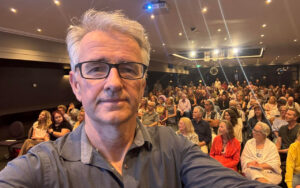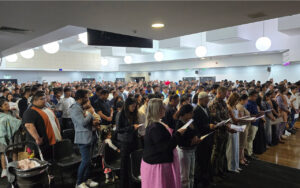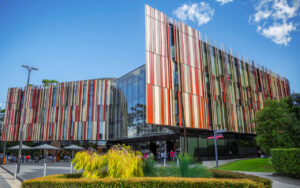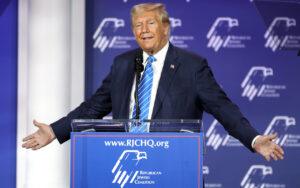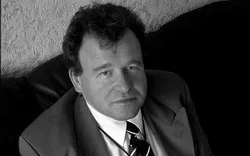In five days, Germany will hold parliamentary elections. These are by far the most important national elections, since they will determine who will actually run the country (unlike in the US, the presidential election in Germany has little significance). This year, there is an unusual twist: Elon Musk and Vice President JD Vance have expressed support for the Alternative for Germany (AfD), which every other mainstream party considers dangerously “far right.”
The current government has been in power since December 8, 2021. These are “anticipated” elections — several months earlier than would ordinarily have been the case — because last November, Chancellor Olaf Scholz announced the failure of the “traffic light coalition” because Finance Minister Christian Lindner of the Free Democratic Party (FDP) left the government.
This coalition got its name from the three parties involved: the “red” Social Democrats (SPD), the Greens, and the “yellow,” free market party FDP (whose colors are yellow and black). The coalition was preceded by 16 years of rule by the Christian Democrats (CDU) under Chancellor Angela Merkel.
The “traffic light government” was never particularly popular and has appointed ministers whose intellectual and character levels are a sad low in the history of the Federal Republic. Foreign Minister Annalena Baerbock (Green Party), for example, is notorious for her naked incompetence and her (sometimes hilarious) inability to utter grammatically correct sentences.
Federal Minister “for Economic Affairs and Climate Protection” Robert Habeck (also Green) loves to report citizens who “insult” him on the internet: for example, in December last year, a 64-year-old pensioner had his house searched because he had shared a post on X in which he called Mr. Habeck a “Schwachkopf” (moron).
Nancy Faeser (SPD), Federal Minister of the Interior, who maintains contacts with a magazine called “antifa,” is primarily concerned with witch hunts against “right-wing extremists” and is, among other things, responsible for the unconstitutional ban of the magazine Compact. (This ban was repealed by the Federal Administrative Court.) The shifty-eyed Chancellor Scholz is a pure opportunist without personal convictions.
The current government is opposed by the CDU, which is led by former Blackrock manager Friedrich Merz, the left-wing populist Sahra Wagenknecht Alliance (BSW), and the Alternative for Germany (AfD) under the leadership of Alice Weidel.
Sahra Wagenknecht is the interesting case of a rare leftist who cares about issues such as national sovereignty and immigration to some degree. In practice, however, her rather small party (a split-off from the post-communist party Die Linke with East German origins) has not had much more effect than snatching a few votes from people unhappy with the current state of German politics who would otherwise vote for the AfD.
The AfD, founded in 2013, is the only real “outsider” and opponent of the current political system, which always acts in mafia-like concert to keep the AfD out of power — even when it is the most popular party.
In the 2024 state elections in Thuringia, it received 32 percent of the vote and would ordinarily have organized a coalition government. Instead, it was kept out of even taking part in the resulting coalition of three left-wing parties. This pattern has now been repeated several times, giving many Germans the impression that what is called “our democracy” is a more or less rigged game to keep the political establishment in power even against the will of millions of voters.
Naturally, the AfD has been labeled “right-wing extremist” by the media and the state. It is said to be such a great danger to the establishment that there has been open discussion of banning it. This would be no easy matter for a party of its size, not to mention the legal hurdles that would have to be cleared. In addition, the mere attempt to ban the largest opposition party casts the self-declared champions of “democracy” in an extremely poor light.
Alice Weidel, who openly lives in a lesbian “marriage,” has rejected the categorization of her party as “right-wing.” This is, of course, quite absurd and does not only contradict the explicit positioning of many of its voters, but also of many of the party‘s star politicians such as Björn Höcke or Maximillian Krah. However, the label “right wing” in Germany has a negative connotation, which is probably why the AfD states in its policy program, “We are liberals and conservatives” (note that “liberal” has a different meaning in Germany than in America and does not mean “leftist”).
Whatever one may think of the party, it has considerably improved the situation of national conservatives, patriots, right-wingers, identitarians, nationalists (or whatever one calls them), by building stable political structures and networks, and even a lot of jobs. It is far removed from any extremism: Like other “right-wing populists” in Europe, it does not seek to abolish the constitutional system but to achieve real national sovereignty for Germany through perfectly legal, democratic means.
The problem, of course, is who defines what is “extremist” or “far right.” According to the German Federal Office for the Protection of the Constitution, you need only advocate an ethnic concept of the nation, or in some cases even factually state that there is a difference between ethnic and merely “civic” Germans.
The AfD is particularly successful in eastern Germany, which is the home of its more “nationalist” wing. There are reasons for this. First, unlike their Western counterparts, East Germans have already lived under an authoritarian, lying, self-declared “democratic” government that ultimately had to bow to the will of the people. Second, the GDR did not practice collective guilt tripping. According to Communist doctrine, it was not the entire German people who were to blame for National Socialism, but rather only the “fascists.” The regime even maintained a considerable respect for national heritage. As a result, national feelings have been better preserved in the East than in the West.
Despite years of smear campaigns, the AfD is now more popular than ever; in the latest opinion polls, it is getting around 21 or 22 percent of the vote, second behind the CDU, which can expect about 29 percent. The AfD is polling surprisingly well with “Zoomers.” Much of its success is due to the dissatisfaction of many citizens with German immigration policy. It fills a clear gap in the German party landscape and is the only party explicitly to take positions that are anathema to all other parties: the preservation of German “language, culture and identity” instead of “multiculturalism,” “more children instead of mass immigration,” “Islam does not belong to Germany,” etc. In its latest election program, the AfD has even explicitly included the word “remigration.”
This concept encompasses measures that could be easily implemented within the current legal framework, such as deportations of illegals, extremists and criminals back to their home countries, as well as “expanding incentives for voluntary return.” These perfectly reasonable policies were the subject of a smear campaign starting in January 2024, after reports of an allegedly secret “far-right meeting” in Potsdam which was absurdly compared to the infamous “Wannsee conference.” ‘
What actually happened in November 2023 was a private talk given by Austrian identitarian activist Martin Sellner about “remigration,” attended by members of AfD. The allegedly “secret” plan can be read in a book by Mr. Sellner with the same title, about how peaceful remigration could be achieved. The attempt of the media to demonize “remigration” backfired. The term became mainstream and has even been used by Donald Trump.
The problem of mass immigration and its collateral damage is, of course, an urgent one in all Western European countries. Even Mr. Merz, as an alleged “conservative,” recognizes that he must strike a restrictionist pose, even though it was his own party under Mrs. Merkel that opened the borders to almost a million “refugees” in 2015.
The “firewall” of the established parties against the AfD, justified with a “never again” in respect to German history, showed a crack at the end of January 2025, when Mr. Merz agreed to accept the votes of the AfD in support of a non-binding “five-point” plan “for secure borders and the end of illegal migration.” Mr. Merz was under pressure because of a stabbing attack in Aschaffenburg by an Afghan who killed a man and a toddler and wounded two other people.
This atrocity was part of a long series of migrant violence: On May 31, 2024, an Afghan killed a police officer with a knife in Mannheim; on August 23, a Syrian killed three people with a knife in Solingen; and on December 20, a Saudi Arabian asylum seeker drove a car into a crowd at a Christmas market, killing six people and injuring nearly 300 more.
Because he accepted AfD support for his five-point plan, Mr. Merz himself became a target of anti-fascist demonstrations and a “Rebellion of the Decent” — the name claimed by a demonstration “against the right” in Berlin. He lost what was left of his credibility when he later ruefully declared that he would never again work with the AfD.
Meanwhile, he has announced with whom he would form a coalition in the event of an election victory: “possibly the Social Democrats, possibly the Greens.” In other words, more of the same: no cooperation with the AfD, no matter how many votes it gets. Meanwhile, the series of migrant murders continues: On February 13, an Islamist-motivated, seemingly “integrated” Afghan bodybuilder steered his car into a left-wing demonstration, killing a mother and her two-year-old child. On February 15, a young Syrian in Villach, Austria, killed a 14-year-old boy with a knife and seriously injured five other people. As usual, it was an asylum seeker who had no reason to be in Germany and who was known to the police for a number of criminal offenses.
One thing that makes the 2025 election unlike any other before is the unexpectedly strong endorsement from the Trump-Musk alliance. Elon Musk started with a much-noted “hangout” on X with Alice Weidel.
This gave her a lot of international publicity and reduced a bit her pariah status, but it was in many ways a disappointing conversation. Miss Weidel preferred to debate nuclear power and whether Hitler was a (sort of) “communist” rather than clearly explaining Germany’s problems and why it needs the AfD.
At the AfD party conference in Halle, however, Mr. Musk surprised everyone by delivering a message via live broadcast in which he called on Germans finally to leave “guilt” behind and vote for the AfD.
Vice President JD Vance also emphatically spoke out in favor of the party’s policies at the Munich Security Conference. He deplored mass immigration to Europe as well as the suppression of free speech: “I believe that dismissing people, dismissing their concerns or worse yet, shutting down media, shutting down elections, or shutting people out of the political process protects nothing,” he said. “In fact, it is the most surefire way to destroy democracy.”
And then, directly addressing the practice of freezing out the AfD: “Democracy rests on the sacred principle that the voice of the people matters. There is no room for firewalls. You either uphold the principle or you don’t.” Of course the government parties as well as the CDU reacted by condemning Vance’s speech as “unacceptable,” thus proving his point. In fact, the speech drove the CDU in exactly the opposite direction of denouncing the AfD even more fervently than before. Chancellor Scholz also rebuked Vance in the usual tiresome language: “ ‘Never again’ is the historical mission that Germany as a free democracy must and wants to continue to live up to every day,” he said. “Never again fascism, never again racism, never again war of aggression.”
What are the reasons for Mr. Vance’s (perhaps counterproductive) support? Is it possible that the primary target of the speech was an American audience rather than the German establishment? Be that as it may, many patriots in Germany are suspicious about the surprisingly strong Musk-Vance support, because their ultimate goal is to break free from American domination. Mr. Musk seemingly enjoys playing kingmaker, and of course Alice Weidel enthusiastically welcomes his help. But there is a danger that this alliance could create new dependences, and it may well be that Mr. Musk could change his mind about the AfD if it doesn’t do as he pleases. In any case, Mr. Musk wildly exaggerated the importance of this election in his televised speech to the party conference when he said, “I think it could decide the entire fate of Europe, maybe the fate of the world.” We are not there yet.
The AfD will be lucky if it reaches more than 20 percent, but participation in the government is unlikely. The CDU will probably win, but will keep the firewall firmly intact. Still, this election may at least be one step closer to a badly needed change of German and European policies, and that can be achieved only through the AfD.
This article originally appeared on American Renaissance and is republished by The Noticer with permission.
Header image: Alice Weidel (Facebook).

